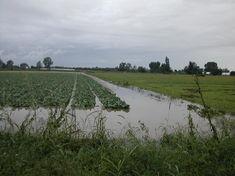
Bad weather blew in from the Atlantic late last week and over the weekend bringing with it copious amounts of water and violent storms that have wrecked field crops, greenhouses and other structures in Italy.
Although there was damage to some structures in Spain’s Almeria, citrus crops in Andalusia and Valencia have benefited from the increased rainfall in terms of sizing and quality.
Italian agricultural organisation Coldiretti announced that the rain has affected all regions. “The losses are impossible to estimate accurately at the moment,” said a spokesman, “and are continually rising, partly as a result of rivers flooding and torrents of water.
“The water was not absorbed by the parched land because it fell so heavily. Thus it tended to flow away immediately, taking the top layer of soil with it and creating the conditions for landslides.”
As much as seven per cent of Italy - a total of over 21,000 km2 - is considered to be at risk of landslides and flooding and the high water levels are delaying harvesting of table grapes and increasing costs for operators as workers have to be paid whether they can pick or not.
In addition, growers are extremely worried about hail - apples and pears are particularly at risk, leaving producers to spread out their nets and hope for the best. Greenhouse structures are also under threat.
Along the coast of the Venice region, entire crops of baby leaf and speciality lettuce have been lost and tomato, capsicum and cucumbers have experienced 30 per cent losses with beef tomato losses calculated by Coldiretti to have reached 50 per cent.
In Spain, 80l of water per square metre fell in Almeria in the middle of last week and some 2,000ha in the area have been affected either by delaying the harvest of salad leaves or damaging structures.
One UK importer reported severe wind damage to baby leaf spinach and other salad crops from both countries with leaves just torn apart. The supply situation is expected to be difficult for at least another month.



